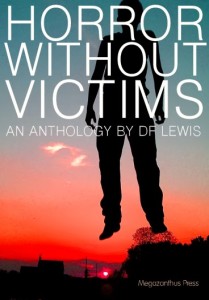
Edited by D.F. Lewis
Megazanthus Press
ISBN: 978- 1291451436
2013; $15.00 trade paperback
Reviewed by Andrew Byers
This is a no-frills collection from Megazanthus Press, edited by D. F. Lewis (I’d have liked a brief introduction by the editor on the theme of the collection and some info about the authors). It plunges straight in to the twenty-five stories included. I must confess to being a little nonplussed regarding the collection’s theme before I began reading. After all, how can there be horror if there are no victims? I’ll be blunt: some of the authors cheated and don’t really adhere to the collection’s theme, which was a little annoying, but there are some enjoyable stories mixed in here that really do genuinely adhere to the idea of a horror story that doesn’t contain victims. It’s an intriguing concept for a themed collection, and clearly an interesting design challenge/constraint for the authors. So how did they do?
Here were a few of the stories that stood out to me (mild plot spoilers follow):
Eric Ian Steele, “Clouds”: A man notices that his city is changing in significant ways every night – buildings are disappearing out of existence – and he’s the only one to notice. Reminded me (thematically at least) of Stephen King’s “The Langoliers.”
Alistair Rennie, “The Carpet Seller’s Recommendation”: A Victorian British businessman living in Turkey takes a “pleasure cruise” on the Bosphorus that we won’t soon forget. Dare I say that his life will never be the same after that voyage?
Mark Patrick Lynch, “Point and Stick”: Ever wonder what goes on inside your neighbors’ homes? The narrator gets a peek inside his downstairs neighbor’s apartment and sees some mysterious goings-on. No spoilers, but it’s an amusing little tale.
All in all, the collection was a decidedly mixed bag. I liked a number of the stories in the collection and appreciated the ones in which the authors found ways to genuinely abide by the theme of “horror without victims.” Other stories meandered or were simply unclear. Without a “victim,” many of the stories simply presented a strange situation that they mostly left unresolved. A lukewarm recommendation; if the collection’s theme intrigues you, then by all means check it out, as it does include some stories well worth reading. I think it really is possible to craft a story that contains plenty of horror without a true victim, though that certainly presents a significant challenge for the author.








